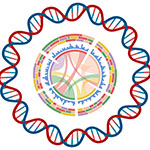Research Summary
Bacterial Pan-Genome Evolution
Evolutionary Biology unravels important findings that strike the attention of scientists from all disciplines, as well as, the public in general. By focusing on microbial genome evolution, the emphasis of my research will be on the evolutionary history of existing pathogenic and non-pathogenic microbes whose genomes are completely sequenced. Currently, microbiologists accept the fact that genome evolution is heavily influenced by lateral gene transfer (LGT or HGT), an important evolutionary process that allows the spread of innovations between closely and distantly related organisms. My research focus is on better understanding of the overall process of bacterial pathogen genome evolution and origin, adaptation, transmission and evolution of pathogenicity and antibiotic resistance among microbes in a wide variety of environments. I will present and employ a fundamentally new and far more suitable mathematical and graphical vehicle for the study of microbial genome evolution that captures the dynamics of gene distributions and evolution across genomes.
I. Evolution of antibiotic resistance among gram-positive priority pathogens
- Evolutionary genomics and structural bioinformatics approaches to understand the genetic, structural, and phylogenetic characteristics of multidrug resistant strain
- Reconstruction of the evolutionary dynamics of major membrane transporters involved in drug inactivation
II. Tackling of antibiotic resistance among gram-positive priority pathogens
- Discovery of novel antibiotic adjuvant molecules & antimicrobial peptides.
- Discovery of novel Biomarkers for the identification of multidrug resistant strains
- CNN based model development for the detection of resistant strains of priority pathogenic bacteria from colony images
- Mining microbial genomes to discover biosynthetic gene clusters for the discovery of novel antibiotics.
Research Programs

Using the high-priority Gram-positive pathogen S. aureus as a model organism, the following topics will be addressed:
- Understanding the evolution of antibiotic resistance elements in Gram-positive pathogens.
- What are the evolutionary trajectories of efflux-based antibiotic resistance elements in Staphylococcus aureus?
- Can insights into the evolution of efflux-mediated resistance inform novel strategies to mitigate antibiotic resistance in clinically relevant bacterial strains?
-
Identification of novel efflux pump inhibitors to tackle antibiotic resistance in Gram-positive
pathogens:
- How can efflux pump inhibitors (EPIs) restore antibiotic activity against Staphylococcus aureus?
- Can combining antibiotics with EPIs be optimized as a strategy to overcome efflux-mediated antibiotic resistance?

Using enormous amount of Big-Genomic data incombination withphylogenomic and network approaches, I would like to address the following questions:
- What is the relative contribution of Lateral Gene Transfer (LGT) and vertical inheritance during microbial genome evolution?
- LGTs are largely responsible for antibiotic-resistant infections worldwide, what is the impact of LGTs in evolution of antibiotic resistance in pathogenic bacteria?
- Where do these bacterial virulent genes come from? What are the common mechanisms of LGTs in pathogenic bacteria?
- What novel approaches to preventing or treating antibiotic resistance can be derived from knowledge of ecology and evolutionary biology?

ESKAPE pathogens pose a major global concern by acquiring multidrug resistance, undermining the existing antibiotics. We like to address the following questions:
- What is the relative contribution of different types of biosynthetic gene clusters (BGCs) in microbial genomes to the discovery of novel antibiotics?
- What strategies can be used to systematically analyze genomic and metagenomic datasets for novel antibacterial compounds?
- How can insights from identified BGCs inform the discovery of new therapeutic molecules to combat antibiotic resistance?
Current Research Grants
-
2026 2023
Genomic and evolutionary characteristics of multidrug resistant Staphylococcus aureus isolates circulating in Kerala,
Kerala State Council for Science, Technology and Environment [KSCSTE] -
2024 2022
Epidemiological Monitoring of SARS CoV-2, and its variants in wastewater systems in the major cities of Kerela, India
SERB, Department of Science & Technology [DST]
Previous/ Completed Research Grants
-
-
Major gene influxes in microbial genome evolution
Department of Science and Technology (DST) 2016-2021 -
Towards an early warning system for infectious disease outbreaks - Geospatial scale metagenomic profiling of mass transit systems in Kerala
Kerala State Council for Science, Technology and Environment [KSCSTE] 2018-2019 -
structure and evolution of Environment resistomes
SERB, Department of Science and Technology (DST) 2018-2021
-